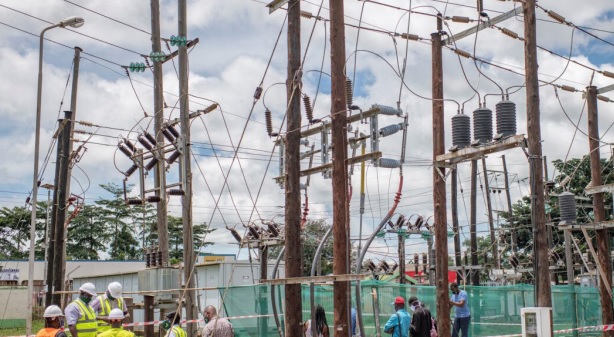
Uganda Electricity Distribution Company Limited to take over from Umeme effective April 1, 2025
Kampala, Uganda | JULIUS BUSINGE | Uganda government is taking a significant step towards securing its energy future with the state-owned Uganda Electricity Distribution Company Limited (UEDCL) set to take over electricity distribution from Umeme, marking the end of Umeme’s 20-year concession on April 1, 2025.
This move comes as the government strengthens its role in Uganda’s energy sector, which is crucial for the country’s industrialization and socioeconomic development.
This milestone follows a series of strategic acquisitions by UEDCL, including the transition of several private electricity concessions to government control. Most recently, UEDCL acquired Kilembe Investments Limited (KIL) in September 2024, bringing the total number of concessions transitioned to five in the last seven years.
Speaking during the license handover ceremony held in Kampala recently, Energy Minister Ruth Nankabirwa emphasized that the government’s decision to directly manage electricity distribution assets is in line with the objectives outlined in the National Development Plan IV and Vision 2040. The government’s strategic priorities include accelerating electrification and ensuring that electricity is affordable, reliable, and accessible for all Ugandans.
“We remain fully committed to ensuring service continuity during this critical transition,” Nankabirwa assured the public. “Existing tariff packages, including lifeline and time-of-use tariffs, will remain operational to safeguard affordability and equitable access,” she added.
The government has set an ambitious target of reaching 80% electricity access within three years, with the ultimate goal of universal access by 2030.
This transition is part of the broader Electricity Access Scale-Up Project (EASP), which aims to leverage both on-grid and off-grid solutions to achieve the country’s electrification goals.
Expanding infrastructure
UEDCL is now tasked with expanding and rehabilitating critical infrastructure, including substations, transformers, and distribution lines, which will be vital in enhancing service reliability across Uganda.
UEDCL’s proven track record in managing the transition of private sector assets gives it a solid foundation for the successful handover from Umeme. Over the past decade, UEDCL has successfully integrated operations from several cooperatives and private entities, including FERDSULT Engineering Limited (2017), Bundibugyo Energy Cooperative Society (2021), Pader Abim Community Multi-Purpose Energy Cooperative Society (2023), and Kyegegwa Rural Energy Cooperative Society (2024).
Nankabirwa also addressed challenges such as power theft, vandalism of infrastructure, and service interruptions, which have affected the sector in recent years.
“I appeal to all Ugandans to protect the electricity infrastructure, fulfill their obligations by paying for electricity services, and refrain from power theft or vandalism,” she stated.
Genesis
As part of the transition, the government has created a framework to ensure that employees from both UEDCL and Umeme are absorbed into the new structure. A total of 2,712 jobs will be allocated exclusively to staff from both companies, ensuring continuity of services and retention of experienced personnel.
UEDCL’s board chairman, Francis Tumuhairwe, reassured stakeholders of the company’s readiness to manage this significant responsibility. With more than 20 years of experience in electricity distribution, UEDCL is confident that it can meet the government’s ambitious targets and continue to improve the country’s energy sector.
The Electricity Regulatory Authority (ERA) commended Umeme for its collaboration with the regulator and the Ministry of Energy and Mineral Development over the years, particularly in the area of reducing tariffs.
However, ERA Chief Executive Officer, Ziria Tibalwa Waako, noted that power theft and equipment vandalism remain significant challenges. Despite these issues, Tibalwa reiterated the commitment to retaining Umeme employees, stating that 98% of staff from previously transitioned concessions have retained their jobs.
With the country’s generation capacity now at 2,052.6 megawatts, up from about 300 megawatts when Umeme took over the distribution mandate, Uganda is better equipped to meet growing demand. However, experts highlight that addressing the challenges of power theft and infrastructure damage remains a priority to ensure reliable electricity for all.
The economic implications of this transition are significant. Reliable and affordable electricity is crucial for Uganda’s industrial growth. For manufacturers, uninterrupted power ensures the operation of advanced technologies that drive productivity. Small and medium enterprises (SMEs) also stand to benefit from reduced production costs, making them more competitive and fostering growth.
In agriculture, reliable electricity supports key areas such as irrigation, cold storage, and agro-processing, which enhance productivity and reduce post-harvest losses. Additionally, the broader economy will benefit from stable power supplies, supporting sectors like healthcare, education, and financial services, while also attracting domestic and foreign investment into energy-intensive industries such as mining and manufacturing.
Uganda’s government shift to a government-led electricity distribution model signals a firm commitment to creating a sustainable energy future. The success of this transition will depend on close collaboration between stakeholders—government, regulators, utilities, and the public—to ensure a smooth and effective handover.
 The Independent Uganda: You get the Truth we Pay the Price
The Independent Uganda: You get the Truth we Pay the Price



